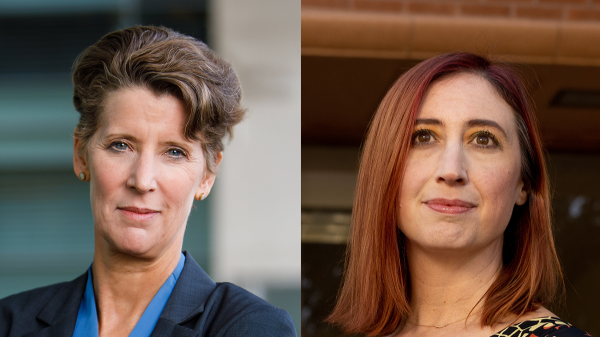ASU professor's webinar series helps boost sports nutrition knowledge

College of Health Solutions Assistant Professor Floris Wardenaar
When the pandemic made learning in person difficult, Arizona State University Assistant Professor Floris Wardenaar embraced the idea of sharing information online.
Wardenaar, a sports nutrition expert in the College of Health Solutions, was already teaching a one-credit class about sports nutrition. When the pandemic started, he moved the class online, removed the credit and reached out to sports nutrition experts and guest speakers.
“I decided now everything is virtual, then there is no barrier,” Wardenaar said. “Let's try to find experts in the area of performance and nutrition. And that's how it started.”
What began as a few Zoom sessions featuring nutrition experts doing one-hour presentations to 35 people now brings in nearly 300 people signing up for every presentation.
The spring 2024 semester will feature 12 sessions, starting with the topic "Cooling or Heating for Muscle Recovery and Adaptation" on Jan. 16. Register for any of the lectures in the series at ASU Nutrition Webinar.
Wardenaar has a reputation for creating lasting relationships with students, and the webinars are a part of it.
“I'm building sort of a network with people that have been signing up, and it looks like a lot of people also return,” Wardenaar said.
Creating a space where information is free-flowing
Avaani Bhalla, a current student, said the webinars are a place where information can be shared by people that she would normally never have the chance to meet.
“It's nice to connect with people all over the world, which is like a big perk of these webinars, since I can't go to certain parts of the world,” Bhalla said.
Nutrition experts will even reach out to Wardenaar and ask if they can be a part of the webinar and showcase their research.
“When I asked them (to be in the webinar), they often say, ‘Yes, yes, I really want to do this’ and that they feel honored to be part of it,” Wardenaar said.
Something else Wardenaar created with the webinars is a space where people can easily access reliable information from world-renowned experts.
“A lot of the participants just don't have the budget to see those speakers in real life, and it's free,” Wardenaar said. “I make a recording, and then I send it out afterward to all signups because it's a worldwide event and people are in different time zones.”
For most who attend, the best thing about the webinars is the information being presented, such as new topics in sports nutrition, and how it can change perspectives. Wardenaar said that even he learns new facts about certain topics.
“I feel like I learned stuff that I wouldn't necessarily always learn in the classroom, so I really like that,” Bhalla said.
The impact of the webinars
Most of the experts include their contact info so that the people watching or attending the webinar can reach out with more questions and build relationships.
“They always give their information if we want to reach out or anything, which is really helpful,” Bhalla said. “And the good thing about nutrition, I feel like everybody wants to really help each other, especially students.”
Wardenaar created a space where learning can thrive.
Parker Kooima, another current master’s student, said the information in the webinars is great because there is no payment to access it.
“It's basically allowed for an extremely accessible way to get free and reliable information from world experts that you can even go and talk to yourself,” Parker said.
“I've been searching for ways to get students involved in explorational learning,” Wardenaar said. “The good part with this topic is that there are always students that reach out and ask if they can help.”
Story by Aidan Hansen, communications assistant, College of Health Solutions
More University news

2 ASU faculty members elected to prestigious National Academy of Medicine
Two distinguished Arizona State University faculty members have been elected to the National Academy of Medicine.Sally C. Morton, executive vice president of ASU Knowledge Enterprise, and…

ASU establishes Center for Free Speech, will host annual free speech forum
Arizona State University is establishing a new Center for Free Speech to encourage the uninhibited exchange of ideas, and the university will launch an annual free speech forum that will begin in…

Public affairs professor, back at ASU after 3 years with NSF, is named Sackton Chair
After three years at the National Science Foundation, Professor Mary Feeney has returned to Arizona State University, where she intends to help early-career women and women of color succeed in…